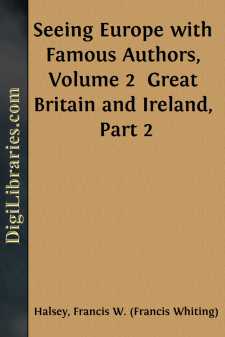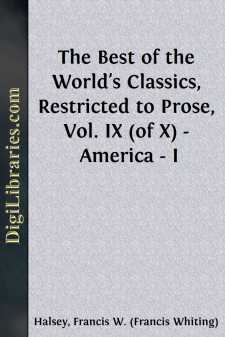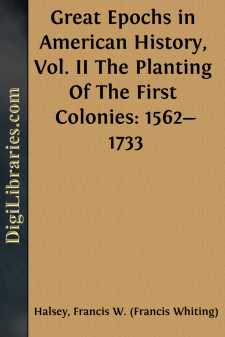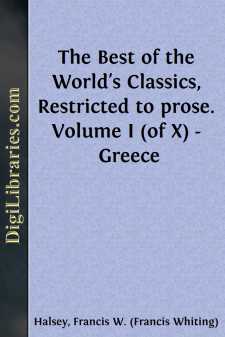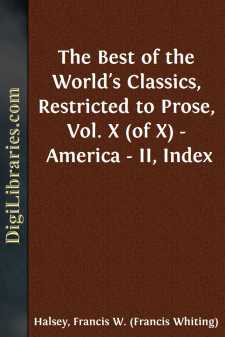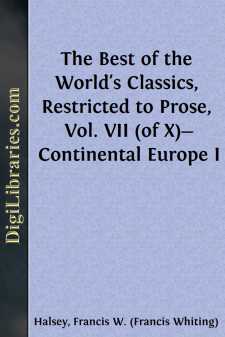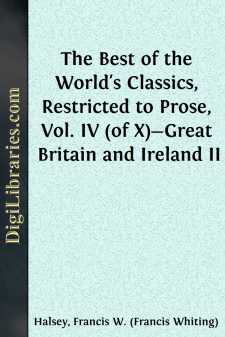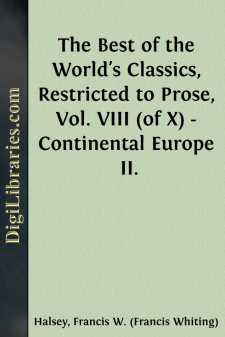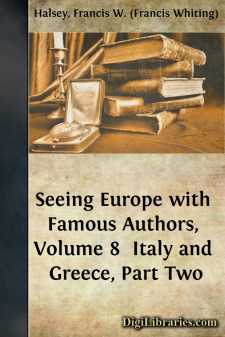Categories
- Antiques & Collectibles 13
- Architecture 36
- Art 48
- Bibles 22
- Biography & Autobiography 813
- Body, Mind & Spirit 138
- Business & Economics 28
- Children's Books 12
- Children's Fiction 9
- Computers 4
- Cooking 94
- Crafts & Hobbies 4
- Drama 346
- Education 46
- Family & Relationships 57
- Fiction 11821
- Games 19
- Gardening 17
- Health & Fitness 34
- History 1377
- House & Home 1
- Humor 147
- Juvenile Fiction 1873
- Juvenile Nonfiction 202
- Language Arts & Disciplines 88
- Law 16
- Literary Collections 686
- Literary Criticism 179
- Mathematics 13
- Medical 41
- Music 40
- Nature 179
- Non-Classifiable 1768
- Performing Arts 7
- Periodicals 1453
- Philosophy 64
- Photography 2
- Poetry 896
- Political Science 203
- Psychology 42
- Reference 154
- Religion 508
- Science 126
- Self-Help 81
- Social Science 81
- Sports & Recreation 34
- Study Aids 3
- Technology & Engineering 59
- Transportation 23
- Travel 463
- True Crime 29
Seeing Europe with Famous Authors, Volume 2 Great Britain and Ireland, Part 2
Description:
Excerpt
It was a comfort as I came out of the Albert Memorial Chapel, and rejoined nature upon the Terrace, to mutter to myself those fine lines which not a hundred years ago everybody knew by heart: "The boast of heraldry, the pomp of power, And all that beauty, all that wealth ere gave, Await alike th' inevitable hour. The paths of glory lead but to the grave,"—a verse which I found it not bad to remember as in the Chapel Royal I gazed upon the helmets, and banners, and insignia of many a defunct Knight of the Garter. I wondered if posterity would care much for George the Fourth, or Third, or Second, or First, whose portraits I had just been gazing at; I was sure that a good many would remember the recluse scholar of Pembroke Hall, the Cambridge Professor of Modern History, who cared for nothing but ancient history; who projected twenty great poems, and finished only one or two; who spent his life in commenting upon Plato and studying botany, and in writing letters to his friend Mason; and who with a real touch of Pindar in his nature, was content to fiddle-faddle away his life. He died at last of a most unpoetical gout in the stomach, leaving behind him a cartload of memoranda, and fifty fragments of fine things; and yet I, a stranger from a far distant shore, was about to make a little pilgrimage to his tomb, and all for the sake of that "Elegy Written in a Country Churchyard," which has so held its own while a hundred bulkier things have been forgotten.
The church itself is an interesting but not remarkable edifice, old, small, and solidly built in a style common enough in England. Nothing, however, could be more in keeping with the associations of the scene. The very humility of the edifice has a property of its own, for anything more magnificent would jar upon the feelings, as the monument in the Park does most decidedly. It was Gray's wish that he might be buried here, near the mother whom he loved so well; otherwise he could hardly have escaped the posthumous misfortune of a tomb in Westminster Abbey or St. Paul's. In such case the world would have missed one of the most charming of associations, and the great poem the most poetical of its features. For surely it was fit that he who sang so touchingly of the dead here sleeping, should find near them his last resting-place; that when the pleasant toil in libraries was over, the last folio closed by those industrious hands, the last manuscript collated, and the last flower picked for the herbarium, he who here so tenderly sang of the emptiness of earthly honors and the nothingness of worldly success should be buried humbly near those whom he best loved, and where all the moral of his teaching might be perpetually illustrated. I wondered, as I stood there, whether Horace Walpole ever thought it worth his while, for the sake of that early friendship which was so rudely broken, to come there, away from the haunts of fashion, or from his plaything villa at Strawberry Hill, to muse for a moment over the grave of one who rated pedigrees and peerages at their just value. Probably my Lord Orford was never guilty of such a piece of sentimentality. He was thinking too much of his pictures and coins and eternal bric-a-brac for that.
A stone set in the outside of the church indicates the spot near which the poet is buried. I was very anxious to see the interior of the edifice, and, fortunately I found the sexton busy in the neighborhood. There was nothing, however, remarkable to be seen, after sixpence had opened the door, except perhaps the very largest pew which these eyes ever beheld. It belonged to the Penn family, descendants of drab-coated and sweet-voiced William Penn, whose seat is in the neighborhood. I do not know what that primitive Quaker would have said to such an enormous reservation of space in the house of God for the sole use and behoof of two or three aristocratic worshipers. Probably few of my readers have ever seen such a pew as that. It was not so much a pew as a room. It was literally walled off, and quite set apart from the plebeian portion of the sanctuary, was carpeted, and finished with comfortable arm-chairs, and in the middle of it was a stove. The occupants could look out and over at the altar, but the rustics could not look in and at them. The Squire might have smoked or read novels, or my lady might have worked worsted or petted her poodle through the service, without much scandal. The pew monopolized so much room that there was little left for the remainder of the "miserable offenders," but I suspect that there was quite enough for all who came to pray....


